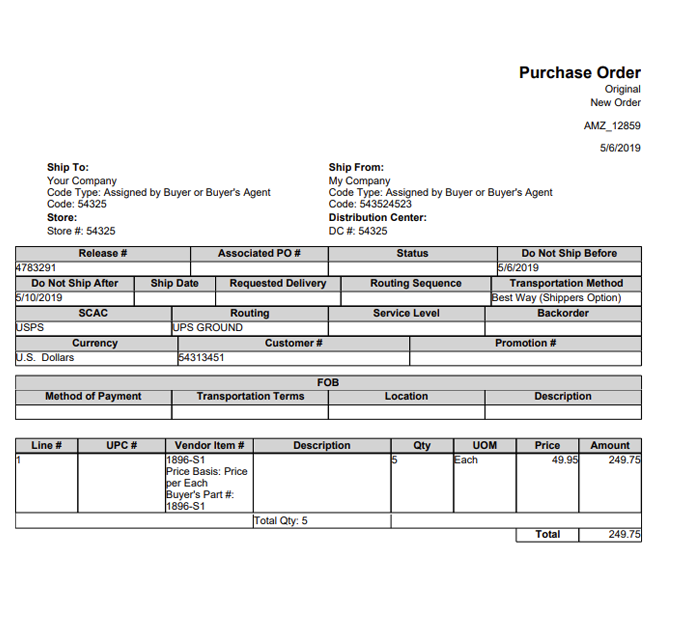EDI 850
Purchase Order

What is an EDI 850?
An EDI 850 is a type of electronic data interchange transaction set that contains details about an order. Also known as an electronic purchase order, an EDI 850 is usually sent to a vendor as the first step in the ordering process. An EDI 850 can be used both for a single purchase, for recurring purchases, or to delete or amend an order as specified by the buyer.
EDI 850 documents follow the x12 format set by the American National Standards Institute (ANSI), a not-for-profit organization that regulates EDI formats in the U.S.
What are the Essential Components of EDI 850?
The EDI 850 transaction set provides the same information as a paper purchase order document. These include:
- PO Number
- Order date
- Requested shipping and/or delivery date
- Vendor details such as name, address and/or contact details
- Buyer details such as name and delivery address
- Buyer billing information
- Item identifiers, such as product SKUs or UPC’s
- Quantity and unit of measure of items ordered
- Price per unit, as well as the total price for the order
- Shipping terms, such as the shipping method, preferred carrier, and desired delivery date
- Proposed payment terms
-
Allowances and charges

How Do I Use EDI 850?
EDI 850 documents are usually sent from the buyer to the seller to initiate an order. After receiving an EDI 850 purchase order, the vendor confirms receipt with an EDI 997 Functional Acknowledgement and/or 855 Purchase Order Acknowledgement. The vendor may also respond with an EDI 810 Invoice to convey invoice details.
Most buyers will have specific EDI requirements that indicate which documents must be exchanged, and when. For example, a buyer may request an 855 Purchase Order Acknowledgement within a specified time frame after sending an EDI 850 purchase order. The buyer may also require an EDI 856 Advance Ship Notice previous to the shipped order arriving at the delivery address.
What are the Benefits of EDI 850?
While an EDI 850 document contains the same information as a paper purchase order, this order method offers additional benefits for both buyers and sellers.
In general, EDI documents are securely encrypted in transit, allowing trading partners to send sensitive data such as pricing and contact information safely. Using an EDI 850 also helps to streamline order processing, so sellers can optimize their business operations, and buyers can receive their goods quickly. For example, when an EDI 850 document is received by the seller’s business system, automated processes can validate and verify the information, flagging any incorrect or missing data. This lets the seller quickly identify order issues and resolve those with the buyer.
Upon receipt of EDI 850, the seller’s EDI software translates the document into a translated format, which can then be input, automatically or manually, into their ERP system. EDI workflows require response documents like the EDI 997, to validate that the EDI transaction was received while the seller works on fulfillment.
EDI Format Example
EDI 850 can be viewed in two formats – a human “readable” version and a “raw” data version. The example below shows the raw EDI data, which is then translated by your business system (ERP) to begin the fulfillment process.
- Click to See Example
-
ISA*00* *00* *ZZ*AMAZON *12*9622309900 * * *U*00401* *0*T*>
GS*PO*AMAZON*9622309900*20191029*1056**X*004010
ST*850
BEG*00*NE*AMZ_12859*4783291*20190506
CUR*BT*USD
REF*CR*54313451
DTM*064*20190506
DTM*063*20190510
TD5**2*USPS*T*UPS GROUND
N1*ST*Your Company*92*54325
N1*SF*My Company*92*543524523
PO1*1*5*EA*49.95*PE*VN*1896-S1*BP*1896-S1
CTT*1*5
SE*12
GE*1
IEA*1*
